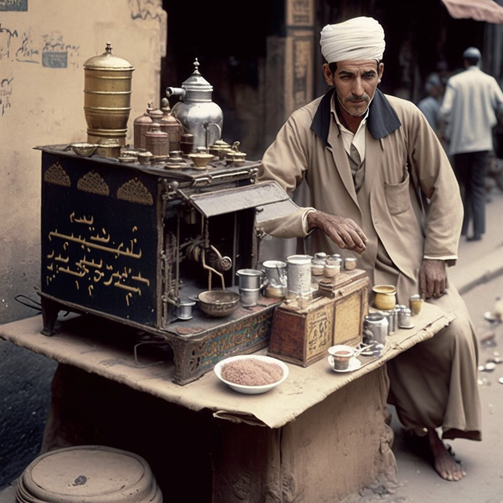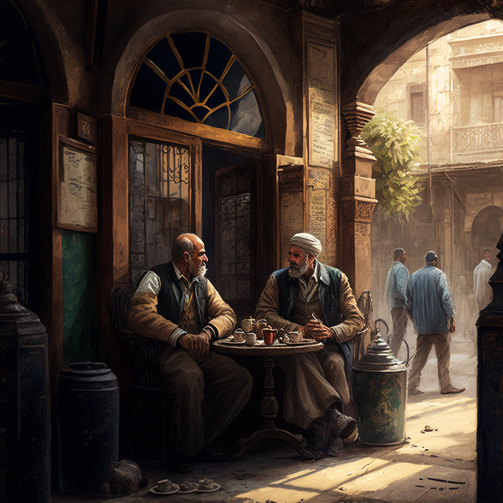Egyptian Coffee
In the land of Pharaohs and pyramids,
Where the Nile flows through the desert's ridges,
There is a drink that warms the soul,
A brew that's ancient, rich, and bold.
Egyptian coffee, black as night,
Steeped with spices, sweet and right.
Cardamom and cloves, a hint of ginger,
A taste that lingers, spicy and finger-licking.
Served in a Dallah, a pot of brass,
A symbol of hospitality, a cup to pass.
Gathered round a table, friends and family,
Sharing stories, laughter, and company.
Egyptian coffee, a drink of pride,
A tradition passed down through the ages,
A bond that ties us to our history,
A taste that takes us back to a time of mystery.
Culture
Coffee culture in Egypt is an integral part of daily life, with many people starting their day with a cup of coffee. There are a variety of coffee shops and cafes throughout the country, serving both traditional and modern coffee drinks.
One traditional coffee found in Egypt is "ahwa," which is made with finely ground coffee beans and served with sugar and sometimes spices. It is typically served in small cups and is often consumed while socializing with friends or family.
In addition to traditional coffee shops, there are also many modern coffee chains and specialty coffee shops in Egypt, offering a variety of coffee drinks such as lattes, cappuccinos, and espressos.
Coffee culture in Egypt is not just limited to the consumption of coffee, but also includes the cultivation and export of coffee beans. Egypt is known for producing high-quality coffee beans, which are exported to various countries around the world.


Bedouins
Bedouins are a nomadic group of people who traditionally lived in the desert regions of the Middle East. They are known for their strong sense of community and their close-knit family structures. Bedouins have a rich history of trading and have traditionally been involved in the production and trade of coffee.
Coffee is an important part of Bedouin culture, and it is traditionally consumed during social gatherings and ceremonies. The coffee is roasted and ground by hand, and it is prepared using a special pot called a dallah. The coffee is typically served with sugar and spices, and it is considered a sign of hospitality to offer coffee to guests.
In recent years, many Bedouins have started to grow and sell coffee as a way to supplement their income. This has helped to preserve their traditional way of life and has also allowed them to share their culture with the rest of the world through their coffee. Despite these changes, the Bedouins continue to value the importance of community and the role that coffee plays in bringing people together.
Stay late at local coffee shops
Egyptian coffee shops, commonly known as "ahwa," are an integral part of the country's social fabric and cultural heritage. These traditional establishments are not just places to grab a cup of coffee but serve as meeting points for friends, families, and even strangers to gather, relax, and engage in conversations that often extend late into the night. One notable aspect of Egyptian coffee shops is their extended operating hours, with many staying open until the early hours of the morning, sometimes even 24 hours.
Here are some key factors contributing to the late-night operation of Egyptian coffee shops:
-
Social culture: Egyptians have a vibrant social culture, and spending time in coffee shops is deeply ingrained in their lifestyle. These establishments provide a space for people to socialize, discuss politics, share stories, play backgammon, and enjoy cultural activities like live music or storytelling. The late-night hours accommodate the Egyptian inclination for late gatherings and conversations.
-
Escaping the heat: Egypt experiences hot weather, particularly during the summer months. Coffee shops offer a respite from the scorching temperatures, as they are often air-conditioned or have outdoor seating areas with fans. This makes them popular destinations during the evening and late-night hours when the weather is cooler.
-
Ramadan traditions: During the Islamic holy month of Ramadan, when Muslims fast from sunrise to sunset, coffee shops take on a special significance. They remain open throughout the night, providing a place for people to gather and socialize after breaking their fast. It has become a tradition for families and friends to spend time in coffee shops during the late-night hours of Ramadan.
-
Availability of refreshments: Egyptian coffee shops serve a variety of hot and cold beverages beyond just coffee. Tea, herbal infusions, and refreshing drinks like hibiscus or tamarind juice are popular options. Alongside beverages, they often offer a range of snacks and traditional sweets, providing sustenance for those seeking a late-night bite.
-
Business opportunities: The extended hours also contribute to the economic viability of coffee shops. By staying open late into the night, they cater to a diverse customer base, including students, night-shift workers, tourists, and those seeking a relaxed atmosphere after a long day. The ability to accommodate different schedules and cater to various preferences helps coffee shops thrive.
It's important to note that the late-night operation of coffee shops in Egypt may vary depending on the location and local regulations. While some establishments remain open until the early hours of the morning, others might have more restricted hours. Additionally, the social and cultural dynamics may differ between urban and rural areas.
Egyptian coffee shops exemplify the significance of communal spaces in Egyptian society, where people come together, share conversations, and enjoy the company of others. The late-night atmosphere in these coffee shops fosters a sense of community, relaxation, and a chance to experience Egyptian culture firsthand.
